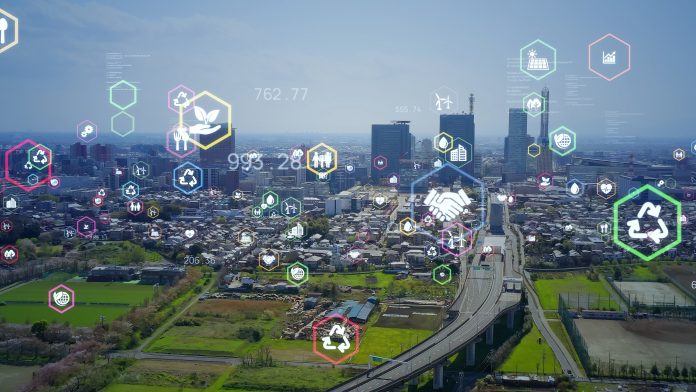Claire Benson, Founder and Director at SDG Changemakers, argues that implementing a sustainable economic policy intervention requires a sustainable government
Climate change is taking its toll on every aspect of our living environment. Not only is inaction exacerbating inequalities and pushing millions into poverty, but according to research from Deloitte, climate change will cost the global economy a staggering $178 trillion over the next 50 years.
Businesses and organisations must play their part in acting against climate change. However, market forces alone cannot solve this problem.
Strong leadership from the government to cull inaction is crucial.
Many governments, such as the UK, have set targets, such as ‘reaching net zero by 2050’ and meeting the 17 Sustainable Development Goals (SDGs), per the Paris climate agreement.
But more still needs to be done.
Achieving the SDGs is imperative to counteract the consequences of historic climate change inaction. If approached with total commitment, they can transform society.
But, unfortunately, the second ‘Measuring Up’ report from the UN Global Compact Network UK reveals scant progress has been made.
We must go beyond simply addressing generic concepts such as ‘net zero’ or ‘economic recovery’ and tackle poverty, economic growth, education, and inequality.
We need speed and direction to make meaningful progress. This requires national leadership that aligns these separate but interconnected issues.
So, how can governments begin the journey?
A clear action plan for sustainable economic policy interventions
Sustainable economic policy interventions can boost investor confidence and send the right market signals.
And while there have been several targeted strategies to reform the energy system, decarbonise industry and transport, and improve housing and heating, money talks.
According to a review of G20 fiscal stimulus spending, the UK performed poorly, with only 10% going toward reducing emissions.
There have been missed opportunities. ‘Levelling Up’ and ‘Build Back Better’ would have been natural partners for sustainable policies.
Yet, ‘green’ was missing in action.
It’s not to say that these plans didn’t have admirable goals, nor that they won’t impact the SDGs. But the connection isn’t explicit, leading to a policy and strategy environment lacking the focus and cohesion to tackle each goal collectively.
For example, last year, the UK government reviewed its net zero policies to “ensure delivery of legally-binding climate goals are pro-growth and pro-business”.
According to the European Parliament, not only may the revised policies cause delays, but its support for fracking and increasing North Sea oil and gas production caused alarm.
It’s an oversight of green investment’s ability to impact growth and business. Due to our lack of vision, we are headed in the wrong direction.
Local and national governments must provide detailed sector-specific action plans in collaboration with industry.
Climate goals may conflict with policies, so a holistic plan – or “systems thinking” approach – is imperative to align the efforts of all government departments because any change can have unintended consequences.
For example, selling farmland for forestry can hugely impact rural communities and the commodities they produce.
Facing economic pressures
It’s worth noting that the government is under substantial pressure.
As the public purse is stretched, green investments and private-sector climate plans can fall behind when more desperate measures are needed.
Some of this pressure is potentially seen in the greenlighting of the coal mine in my home county, Cumbria. Coal contributes substantially to GDP and employment.
As such, it is a simple solution to mobilising more deprived areas by making them more productive.
However, the steel industry is looking for alternative fuel sources. The mine will likely become obsolete, leaving residents and employees no better off. Regions need jobs that have a future.
A climate-positive Cumbria has the potential to employ across industries and sectors, resulting in a more resilient working environment.
A report by local organisation Cumbria Action for Sustainability (CAfS) calculates that around 9,000 jobs could be created during the 15-year transition period
toward the county reaching net zero (Cumbria aims to be the first carbon-neutral county in the UK by 2037).
However, the government must recognise that communities may need help with higher fuel prices and costly conversions during the transition process.
Diversifying the economy in regions that risk losing jobs or livelihoods and providing green employment opportunities will be essential.
To enact this, we must relinquish control of short-term, carbon-intensive industries and anticipate demand for new know-how plus skills for delivering green initiatives.
An investment in funding and a national plan for green skills can identify which skills are needed, where to locate green jobs, and how to invest in education and retraining to diversify the economy, ensuring that costs and benefits are more fairly distributed.
Although it would cost more initially, it would boost productivity. There’s a reason it’s forecast that a successful ecological transition could increase global revenues by up to $43 trillion.
Incentivising people & industry to live sustainably
Changing behaviour or consumption choices have been difficult due to a lack of understanding.
According to Kantar’s Sustainability Sector Index 2022, beyond affordability, a lack of knowledge about sustainable alternatives is the main barrier preventing people from living sustainably.
People need to be educated about the effects of their lifestyle choices to make more sustainable consumption and behaviour choices – such as investing ethically, driving electric vehicles, retrofitting homes, or changing diets.
Furthermore, research shows that people will change their lives if they see it as part of a broader national effort to reduce emissions.
In addition to incentivising people, we need to mandate a change in the market. Incentives and penalties encourage businesses to align activities with climate goals.
It was a massive step in 2022 when the UK became the first G20 country to enshrine mandatory Taskforce on Climate-related Financial Disclosures (TCFD) – aligned reporting of its largest companies and financial situations.
However, an FCA review found that disclosures remain inconsistent with TFCD standards; businesses struggle with a lack of guidance.
Thus, the government must also provide tools to help businesses understand their emissions, how to combat them, and how to share this information with the public.
The government acknowledges the need to grow sustainably. However, it has yet to achieve a coherent sustainable economic policy.
Ultimately, climate change requires a collaborative effort and understanding from all parties. Government decisions now will set the economic trajectory for years to come, influencing how climate action is implemented globally at the necessary speed and scale.











